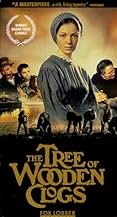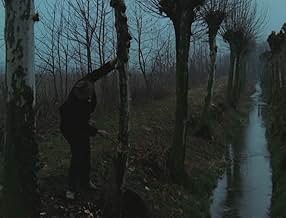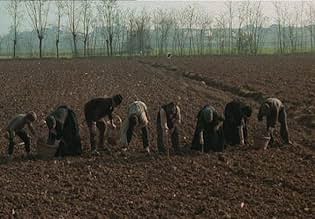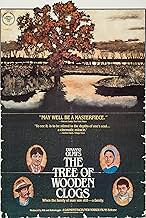Adicionar um enredo no seu idiomaPeasant life in a feudal farm in rural Italy at the end of the 19th century.Peasant life in a feudal farm in rural Italy at the end of the 19th century.Peasant life in a feudal farm in rural Italy at the end of the 19th century.
- Ganhou 1 prêmio BAFTA
- 18 vitórias e 1 indicação no total
Enredo
Você sabia?
- CuriosidadesAll the actors were real peasants from the Bergamo province, in Italy. They had no acting experience at all.
- Erros de gravaçãoWhen the children are making music with pots and pans, the 'instruments' of the little girl are switching from one hand to the other when the camera looks at her from the other side.
- Citações
[first lines]
Don Carlo: That boy should be going to school.
Batistì: Yes but six kilometers to school and six kilometers back seems a lot.
Don Carlo: He's young, he has strong legs.
Batistì: Just when we're about to have another baby. He could have started helping me around the house.
Don Carlo: He'll help you even more when he's older. Let providence provide for now.
Batistì: I grew up without ever seeing the inside of a school.
Don Carlo: That's not a good reason, and you know it. If God has given your boy a good mind, it's a sign he's expecting more of him. As the boy's father, it's your duty to do God's bidding.
- Cenas durante ou pós-créditosQuite strangely, the names of the actors are listed as "last name first name", while the names of the rest of the crew are correctly listed as "first name last name".
- Versões alternativasThere are two versions of this movie: one which is spoken in the dialect of Bergamo, Italy, and one in which the actors dubbed themselves in Italian.
- ConexõesEdited into Bellissimo: Immagini del cinema italiano (1985)
- Trilhas sonorasIch steh' mit einem Fuß im Grabe BWV, 156
Composed by Johann Sebastian Bach
Performed by Fernando Germani
This film is sort of a more modern Neo-realist sort of film because like the Neo-realist films of the 1940s and early 1950s, it is an Italian film that consists of non-professional actors in natural settings. However, the reason why this was done is quite different. During the time of WWII and post-war Italy, sets and actors were hard to come by and directors (such as De Sica and Rossellini) had no choice but to make these sorts of films. However, in 1978 the film was made this way for entirely different reasons--to heighten the sense of realism as the film was about simple folks and having professionals playing these roles might have detracted from this realism.
The film is set on a farming collective owned by a landlord. Five families work the land and share a large compound broken down into separate apartments and stables. The life is pretty simple and rather grim and the film does a very good job of portraying this life. And this is much of the problem with this film for the average viewer. While history teachers like me might find it all pretty fascinating and like how accurately this is all portrayed, will the average viewer? Probably not. That's because not all that actually happens in the film---and it lasts about three hours. As a result, the film does drag and I even found myself feeling sleepy as I watched. It's exceptionally well crafted but also a bit of a chore to view.
"Tree of Wooden Clogs" is a film that film critics will adore but the average person will probably hate...and many folks will feel guilty because they didn't 'get' the movie and think they should have.
- planktonrules
- 2 de ago. de 2011
- Link permanente
Principais escolhas
- How long is The Tree of Wooden Clogs?Fornecido pela Alexa
Detalhes
- Data de lançamento
- País de origem
- Idioma
- Também conhecido como
- The Tree of Wooden Clogs
- Locações de filme
- Empresas de produção
- Consulte mais créditos da empresa na IMDbPro
Bilheteria
- Faturamento bruto mundial
- US$ 9.367
- Tempo de duração3 horas 6 minutos
- Mixagem de som
- Proporção
- 1.33 : 1
Contribua para esta página



















